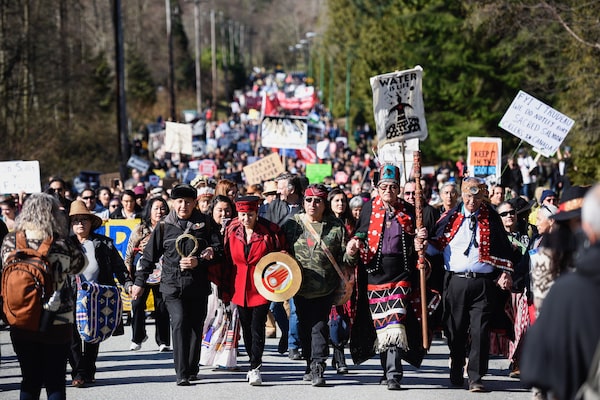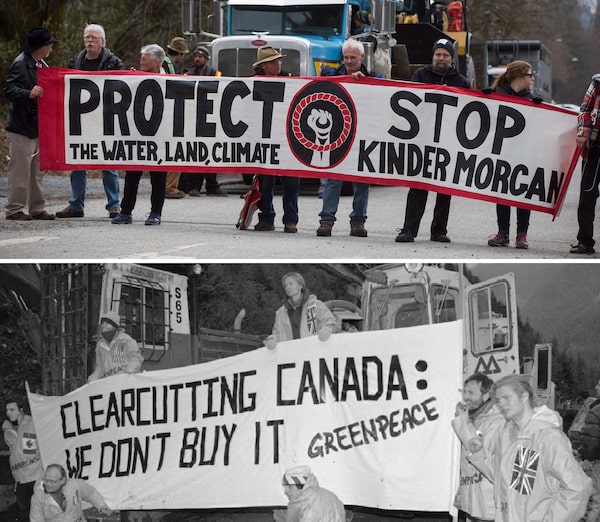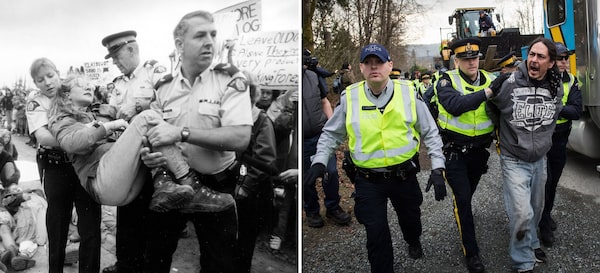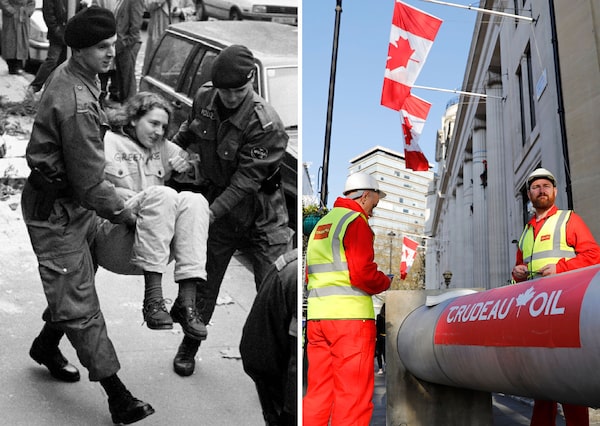
Opposition to the Trans Mountain pipeline expansion has prompted protests in B.C. and around Canada and the world. Here, demonstrators march near the Kinder Morgan facility in Burnaby on March 10.Rogue Collective / Greenpeace
Tzeporah Berman is a professor, mother, writer and environmentalist who was the blockade co-ordinator in B.C.’s Clayoquot Sound, where she was arrested and charged with 857 counts of criminal aiding and abetting. She is currently a director of Stand.earth.
In recent weeks, hundreds of Canadians have been arrested for peaceful protest at the gates of the Kinder Morgan oil facility in Burnaby, B.C. They run the gamut from Indigenous leaders to grandmothers, engineers to economists, scientists to school teachers – even politicians have been blockading the gates to the Kinder Morgan terminal. It is a story that has dominated headlines across the country and plunged the country into a war between provinces and governments, with some observers predicting this crisis could turn into another Oka.
You’ve got to ask yourself: What is happening for Canadians to take the law into their own hands? After all, it’s not the kind of behaviour we are known for. There’s an old joke: How do you get 20 Canadians out of a swimming pool? You say, “Hey, you Canadians, please get out of the pool!” On the whole, we’re a pretty compliant bunch.
In their founding document, our American neighbours got life, liberty and the pursuit of happiness. Instead, we got peace, order and good government. But don’t mistake that compliance for indifference. Canadians are lauded as good global citizens, not because we blindly embrace the status quo and keep a low profile, but because we confront injustice, stand up for equality and rights and punch above our weight when it comes to global-scale challenges.
But, sometimes, injustice and inequality needs to be confronted here at home. The climate crisis and the systematic abdication of our responsibilities to First Nations are two of the greatest challenges facing Canada today, and they are intertwined with the high-stakes fight over the Kinder Morgan pipeline.
The fact is, this is not simply a disagreement over a new pipeline project. With 19 municipalities and the majority of the First Nations in fierce opposition (of the 150 impacted First Nations who were approached, only 43 agreed to support the project, leaving 107 First Nations opposed), something much more profound is at play: Our political and economic systems and institutions have swung out of balance and need reform. We need to face the challenge of climate change. And governments must recognize that Indigenous consent isn’t optional. It’s vital.

Above: Protesters against Kinder Morgan's Trans Mountain pipeline expansion hold a banner in Burnaby, B.C., as a transport truck sits idle behind them while others block a gate March 19, 2018. Below: Members of the environmental group Greenpeace set up a roadblock near Clayoquot Sound in 1993.The Canadian Press
I first experienced the power of protest in Clayoquot Sound. This year is the 25th anniversary of the height of the logging protests, where more than 1,000 people were arrested. I met thousands of fascinating people (including my future husband) as we camped in a clear-cut area called the Black Hole, and woke every morning at 4 a.m. to block the logging road at Kennedy River Bridge. We loved the immense, moss-covered, 1000-year-old cedars. And we knew we had to take a stand against the entrenched logging system before it was too late for all the old-growth rain forests of the West Coast.
Civil disobedience is a last resort to show the injustice of outdated or unjust laws, when groups of people are jailed over a matter of conscience. We camped, we sang (I’m hearing some of those songs again, at the Kinder Morgan gates), we banded together and met by the fire each night and we hashed out statements of non-violence to match our idealism and our belief in “people justice.” B.C.’s prisons were suddenly full of inmates needing vegetarian meals and starting recycling programs.
Clayoquot happened because B.C.’s political system and institutions were failing to process change. Since the early days, the B.C. government had been like an arm of the logging industry with parties of the left and right alike doing its bidding. First Nations and their legal rights over their traditional territory were barely an afterthought. When challenged, government and industry told us “clear-cutting was good for the forest.” Really? Looking back, it seems outlandish to believe this was the government line. The rhetoric itself indicated how deeply the system was broken.
The dispute almost brought down the B.C. government.
It unleashed reforms to forest practices all over the province and, indeed, around the world. Major customers joined the call for more protection, a change in forest practices, certified forest products and an end to clear-cutting. First Nations ended up playing a powerful leadership role in resolving the situation, not just in Clayoquot but in all of B.C.’s coastal rainforests. New systems and institutions, such as the Forest Stewardship Council, the BC Forest Practices Code and Iisaak Forest Resources were created to reflect changes in underlying values. By the end of the protests, 86 per cent of Canadians were calling for the protection of Clayoquot Sound. Today, over a million tourists a year visit Clayoquot to experience the kind of nature our government and the forest industry were once set up to destroy. At the time, one premier called us enemies of the state for organizing campaigns to protect Clayoquot Sound and the Great Bear Rainforest. Ten years later, another premier called us heroes – for the same work.

Left: RCMP officers lead a woman away from a protest on logging roads at Clayoquot Sound on Aug. 9, 1993. Right: Dan Wallace of the Kwakwaka'wakw First Nation is led away by RCMP officers at an anti-Kinder Morgan protest in Burnaby on March 19, 2018.The Canadian Press
Fast forward to this Earth Day weekend.
With the mass arrests (more than 200 people have been arrested in the past month) over the building of the Trans Mountain pipeline, there are similarities with Clayoquot, but also differences. Indigenous leadership is a powerful force, and although the government hasn’t yet woken up to this change, people on the ground clearly have. Those who block the gates of Kinder Morgan, facing down trucks, will cite the UN Declaration on the Rights of Indigenous Peoples as often as they mention the Paris climate agreement. Everyone knows and acknowledges that they are on the unceded Coast Salish land of the Tsleil-Waututh, Musqueam and Squamish peoples.
There is a sense of pride as Indigenous and non-Indigenous people work together. But make no mistake: The Kinder Morgan protests are being led by First Nations, and they have much stronger legal and moral standing than they did 25 years ago. Any resolution must recognize their rights and their leadership. Reconciliation means seeking consent, and not just the window dressing of consultation.
Clayoquot was big, but the stakes with this new oil sands pipeline are far bigger. While I joined Clayoquot as a 23-year-old idealist, and fell in love with my husband at the fireside and on the blockade, now I join this new fight as a mom, keenly aware of my responsibility as a parent to protect the future for my sons. I’m fiercer now and so are the people I am standing beside, horrified by the rise in extreme weather, the forest fires that have devastated our province and the floods and droughts setting records around the world. And we will fight against climate change with every breath in our bodies. For the sake of our children, we will give it everything we have.

Edmonton
Existing pipeline-active
Existing pipeline-reactiv.
New pipeline
Proposed new line:
Heavy crude oil
Terminal
Adjacent pump stations
ALBERTA
BRITISH
COLUMBIA
Existing line:
Refined products,
synthetic crude oils
and light crude oil
Westridge
CANADA
Burnaby
Ferndale
UNITED STATES
Anacortes
THE GLOBE AND MAIL, SOURCEs: KINDER MORGAN; ESRI

Edmonton
LEGEND
Existing pipeline-active
Existing pipeline-reactiv.
New pipeline
Proposed new line:
Heavy crude oil
Terminal
Adjacent pump stations
ALBERTA
Coast Mountains
BRITISH
COLUMBIA
Existing line:
Refined products,
synthetic crude oils
and light crude oil
Kamloops
Westridge
CANADA
Burnaby
Ferndale
UNITED STATES
Anacortes
THE GLOBE AND MAIL, SOURCEs: KINDER MORGAN; ESRI

Edmonton
LEGEND
Existing pipeline-active
Existing pipeline-reactivated
New pipeline
Proposed new line:
Heavy crude oil
Terminal
Adjacent pump stations
ALBERTA
Coast Mountains
BRITISH
COLUMBIA
Existing line:
Refined products,
synthetic crude oils
and light crude oil
Kamloops
Van.
Island
Westridge
Sumas
Burnaby
CANADA
Ferndale
Pacific
Ocean
UNITED STATES
Anacortes
THE GLOBE AND MAIL, SOURCEs: KINDER MORGAN; ESRI
This time, the imbalance the protest is addressing is due to oil. Decades ago, with the boon of oil sands development, we designed our economy and institutions around further oil expansion. No one ever considered how big it should get. No one spoke of the many risks, whether from oil spills, toxic tailings ponds, air pollution or habitat destruction. But now we do so with regularity. We have no choice.
Climate scientists were some of the first people to raise concerns. The science is conclusive – we must begin to replace fossil fuels with clean energy, or else create dangerous disruptions to everything we value. That doesn’t mean we turn the taps off overnight. It doesn’t mean we have to stop using or producing oil today. It means we need to start to plan so that we can begin the transition that our governments agreed to when former prime minister Stephen Harper signed agreements at the Group of Seven to “decarbonize” this century and when Prime Minister Trudeau signed the Paris accord. We simply cannot move away from fossil fuels while building more fossil-fuel infrastructure and approving more fossil-fuel projects.
Having a conversation about a transition away from oil, or a reduction in oil production, is a conversation that is very difficult for Canada. We produce a lot of it and we fall back on an old deep-rooted identity as hewers of wood and drawers of oil.
The Kinder Morgan pipeline debate is more than one energy project with various sides; it represents a reckoning for our country. Can we have the difficult conversation, finally?
Can we start talking meaningfully about how Canada must plan for a just transition for workers and their families? Can we start talking meaningfully about how Canada must begin to phase out new oil and gas production, as we’re doing with coal? The Trans Mountain pipeline is chipping away at the walls of denial. That’s why it’s so intense. That’s why it’s so messy.
It’s true that both the Trudeau and Notley governments have introduced stronger climate plans than we have ever seen in this country. But they’ve fallen very short of the change needed by refusing to address the expansion of the oil and gas industry. Canada does not yet have a credible plan to meet our climate targets, and the bizarre rhetoric that we need a new oil pipeline to save the climate only reinforces the depth of institutional denial over the truth of climate change. It’s “clear-cutting helps forests,” – 2018 style.
Vancouver and Burnaby are being asked to accept a sevenfold increase in risky tanker traffic and a dramatic expansion of tank farms next to schools and houses, when the conversation should be about an oil industry that already produces four million barrels a day, and how that’s already big enough. The conversation should be about how we diversify our economy, how we lift up other industries, how we ensure our economic health in the climate era and support leaders in clean energy, clean tech and build the electrification systems and digital infrastructure of tomorrow.
Instead, the conversation doesn’t touch these vital issues, and when political denial is so potent, when one highly profitable industry has so much political sway and power, despite the fallout for millions, these are the conditions under which people will protest and put themselves on the line.
We Canadians do like to get along with our neighbours, but at the same time we’re not afraid to stand up when we know something is wrong and we’re not easily fooled. Clayoquot exposed a rupture in our system, and many brave people sacrificed their freedom to help fix it. The mass arrests over Kinder Morgan likewise show that once again we face a serious imbalance – the focus on oil over all other interests.
There are moments in history when our governments fail us – when they are too influenced by the next election cycle or those that stand to benefit from the status quo. These are the moments when we are called to stand up. The power of the people to speak out, to demand better – it is the most powerful tool we have, and we will continue to use it.

Left: A Greenpeace member, protesting against deforesting Clayoquot Sound, is carried away from the entrance of the Canadian embassy in Vienna. Right: On April 18, 2018, demonstrators erect a mock oil pipleine reading "Crudeau Oil" outside the Canadian High Commission in London.Reuters and The Canadian Press